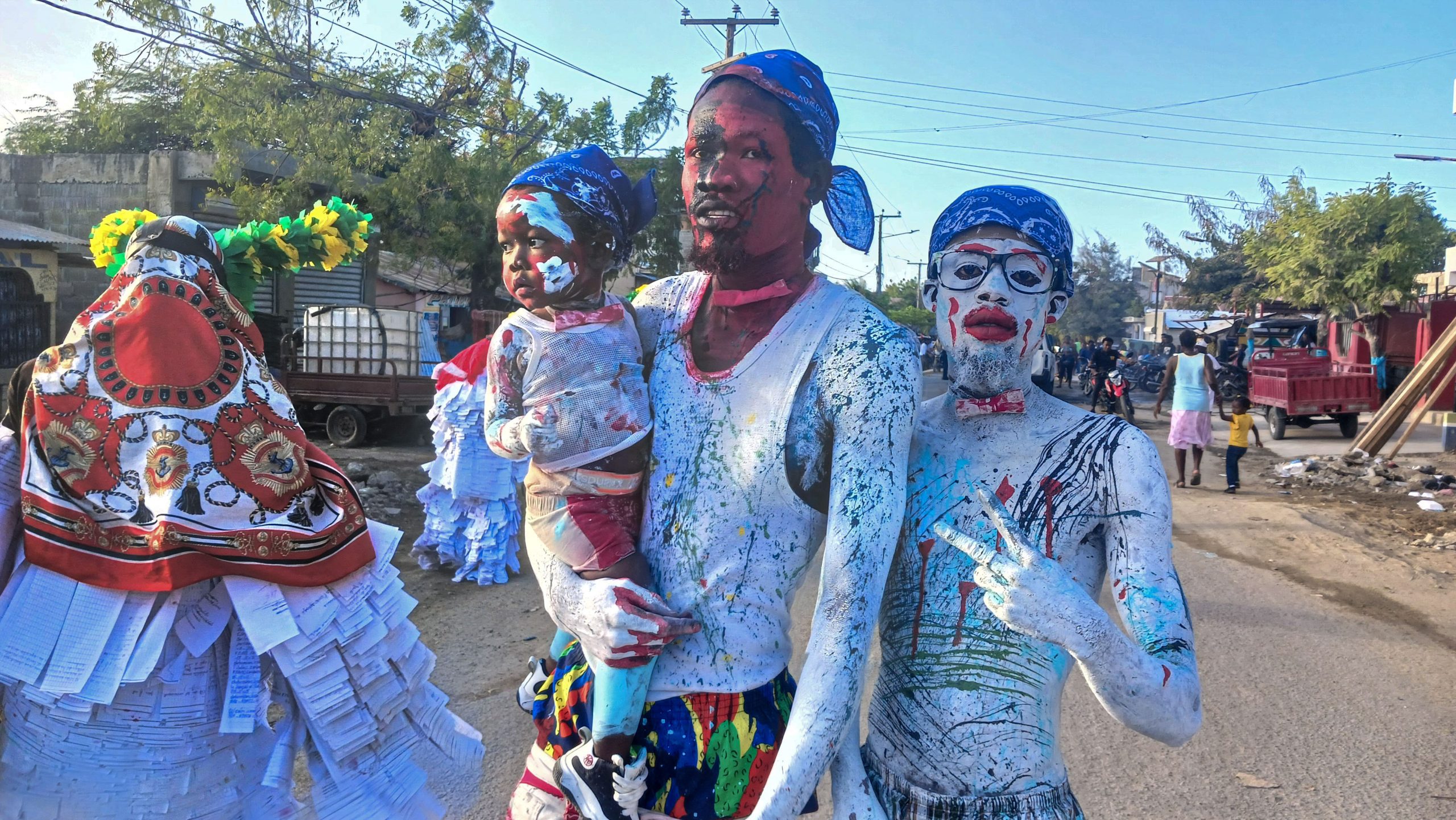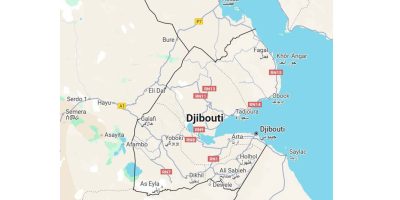Overview:
On Feb. 2 masqueraders, foot bands and revelers coming from all over the northeast department flooded the streets of Fort-Liberté in a swirl of color and sound as Haiti’s long-awaited National Carnival returned.
FORT-LIBERTE— Haiti’s long-awaited National Carnival returned to Fort-Liberté with a pre-carnival prelude on Feb. 2 bringing back the electric energy of the country’s most beloved tradition.
From March 2 to 4, the historic coastal town in the Northeast Department will become the heartbeat of Haitian culture, hosting the three-day carnival, a celebration pulsing with joy, defiance, and national pride. Under the theme “Haiti Debou,” creole for “Haiti Standing,” revelers will dance through the streets until the wee hours of the morning.

An unforgettable spectacle
The energy of the pre-carnival kickoff was undeniable. From dawn to midnight, the city was alive with performances, parades, and colorful showcases. Revelers danced through the streets, their faces painted in dazzling hues, their costumes adorned with papier-mâché and feathers. Some mimicked famous personalities or celebrities, while others embraced the spirit of carnival with laughably outrageous outfits.

The Madigras—, masked figures in exaggerated costumes—wove through the crowd. Their laughter echoed as they playfully scared onlookers, a reminder of the country’s deep historical traditions. No Haitian carnival is complete without those mischievous Madigras, otherworldly figures whose presence is as much about storytelling as it is about entertainment. Their elaborate, hand-stitched costumes and grotesque masks turned the streets into a moving art gallery, each character embodying a different part of Haiti’s folklore.
“Although I don’t like the Madigra because they’re a little creepy, they are an essential part of our carnival culture,” admitted one carnival-goer, laughing as she dodged a masked figure lunging toward her. “They bring joy, fear, and humor all at once.”
-

Masqueraders in Mardi Gras costumes, masked figures in exaggerated charcoal paint that is a reminder of the country’s deep historical traditions. Photo by Edxon Francisque for The Haitian Times. -

Masqueraders in Mardi Gras costumes, masked figures in exaggerated charcoal paint that is a reminder of the country’s deep historical traditions. Photo by Edxon Francisque for The Haitian Times. -

Two men, part of the Lavi Souri a Madri Gras group, wear exaggerated charcoal paint and masks. Their costumes are reminiscent of the country’s deep historical traditions. The men add to the atmosphere at the carnival launch on Feb. 2nd. Photo by Edxon Francisque for The Haitian Times.
-

A man with a lion mask walked in the crowd that stood in front of the Fort-Liberté city hall. Photo by Edxon Francisque for The Haitian Times
Foot bands, dressed in matching outfits, filled the streets with color and rhythm. For musicians, it was a moment to shine. Brass and drum bands, including Po Piman des Perches, Sipriz de Terrier Rouge, Bel Poze de Ferrier in the commune of Ouanaminthe, and Delivrancia band, unleashed a flood of sound that swept through the city.
“We came here to make the city vibrate with music,” said the maestro of Bèl Poze of Ferrier, his face glistening with sweat after leading an electrifying set.

“Getting to perform at the National Carnival is never easy. Having the opportunity in Fort Liberté is a blessing. We will do everything we can to bring the heat,” one bandleader from Popiman Des Perches added.
A huge dance party erupted near the town square, where revelers of all ages swayed to the hypnotic pulse of kompa and rara music, their bodies catching the golden glow of streetlights and torches.
The people’s pre-carnival
From the narrow alleyways to the broad streets and the city’s square, the people of Fort-Liberté embraced the festival with open arms. Thousands lined the streets, their faces painted with national symbols, their hands clapping to the infectious rhythms. Families, friends, and visitors poured in, their voices joining the chorus of celebration.
The spectacle attracted visitors from all over the island and even from abroad, helping to boost tourism in Fort Liberté.
“It’s incredible to see so many people come out for the first day of the pre-Carnival in Fort Liberté. It shows how different Fort Liberté is,” said Michael, a reveler who had traveled from Terrier Rouge to enjoy the atmosphere.
-

Scenes of Haiti’s daily insecurity reflected in the Feb. 2 festivities: Children wearing Red Cross masks faced a masked man in a black uniform, wielding a gun in his hand. Photo by Edxon Francisque for The Haitian Times -

The sounds of marching bands filled the air as a jubilant crowd gathered in front of the city hall stalls for the first day of the pre-carnival.Photo by Edxon Francisque for The Haitian Times
Departmental delegate Moise Charles Pierre and Mayor Louis Jacques Etienne Junior officially opened the celebrations, emphasizing the carnival’s importance in bringing the community together and strengthening residents’ sense of belonging and pride.
“The Carnival is a unique opportunity to celebrate our culture and our history,” the mayor said.

A festival with high ambitions
The Fort-Liberté Carnival Committee has set the bar high, unveiling an ambitious budget of 536 million gourdes about USD 4.1 million allocated for the pre-carnival activities and critical development work in tourist sites across the Northeast Department.
“We are committed to delivering a carnival of exceptional quality,” officials announced at a press conference on Feb. 1. Funds will go toward ensuring a vibrant, well-organized event while also improving local tourist sites, boosting infrastructure, and strengthening security measures.
“Carnival is the expression of our joy of living, of our ability to get up despite the difficulties. Haïti Debou is our rallying cry, for all the daughters and sons of the country to put their hands in the paw to build our dear Haiti.”
Louis Jacques Etienne Junior- Mayor of Fort-Liberté
They announced a plan for a celebration that will not only entertain but leave a lasting impact on the city’s cultural and economic landscape. The success of the first pre-Carnival day in Fort-Liberté has sparked optimism for the upcoming March event. Organizers plan to expand the festivities in the coming days, adding more activities and accommodating groups that couldn’t participate on the first day despite being invited.
Mayor Etienne Junior urged Haitians worldwide, especially entrepreneurs, to contribute to the event’s success.
“We urge all residents of Fort-Dauphin and all Haitians, whether locally or abroad, to contribute. We need to organize a significant event.”














